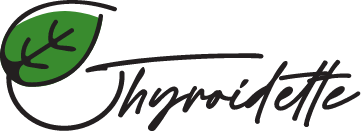Thyroid Antibodies and thyroid related hormones: What they actually do
In this article, we will look deeper into what thyroid antibodies actually mean. We will look first at the normal, healthy protein that is important to thyroid function. Then we will look at the antibody to the specific protein. We will also discuss TSH and TBG, a hormone and a protein that regulate thyroid hormones, but are not produces by the thyroid.
- antithyroid peroxidase antibody
- What is thyroid peroxidase?
“TPO catalyzes the iodination of tyrosine residues of Tg to form monoiodotyrosine and diiodotyrosine” (Davies, 2022). This enzyme is also responsible for oxidizing iodide into iodine and for combining monoiodotyrosine and diiodotyrosine to create thyroid hormones (Ross, 2022). Simply said, TPO creates thyroid hormones.
- How/ why do we find antibodies to this enzyme, as well as to thyroglobulin?
This is because TPO leaked from the thyroid, so the immune system sort of realizes there is a protein in circulation that should not be there. A positive titer is greater than 9 IU/mL (Pagana et al., 2021).
- antithyroglobulin antibody
- What is thyroglobulin?
Thyroglobulin [Tg] is a protein in usually found in the thyroid exclusively. It participates in the production of thyroid hormones (Pagana et al., 2021). “ Tg is synthesized by follicular cells and secreted into the lumen of the thyroid follicle, where it is stored as colloid” and contains many tyrosine residues in its amino acid sequence (Davies, 2022), Essentially, thyroglobulin is where thyroid hormones are produced and stored. When TSH stimulates the thyroid, the thyroid takes up Tg again, where enzymes break the hormones free for Tg to be released into blood circulation (Davies, 2022). Simply said, TG stores and releases thyroid hormones in/from the thyroid.
- How/ why do we find antibodies to this protein?Antibodies to this protein suggest there is inflammation, hemorrhage, or destruction to the thyroid gland, which resulted in these proteins to leak out and for the immune system to mount an autoimmune response (Pagana et al., 2021). I previously thought that it was the other way around, that both antithyroglobulin antibodies and antithyroid peroxidase antibodies had to be elevated for thyroid disease to progress, but it seems that this marker specifically indicates that for some reason or another, the thyroid was inflamed first and because the proteins leaked out, we find elevated antibodies in a blood test. A positive test is greater than 116 IU/mL (Pagana et al., 2021). Both Anti Tg and Anti TPO are used in diagnosing Hashimoto thyroiditis (Pagana et al., 2021).
-
thyroid-stimulating immunoglobulins
“Thyroid-stimulating immunoglobulins (TSI) represent a group of immunoglobulin-G (IgG) antibodies directed against the thyroid cell receptor for …TSH” (Pagana et al., 2021). When they bind to the receptor, they usually have the same effect as TSH and stimulate hormone production, but unlike TSH there is no homeostatic feedback to regulate this stimulation and so, hormone production is overly increased (Pagana et al., 2021). A TSI above 130 % of basal activity is indicative of Graves disease (Pagana et al., 2021).
- thyroid-stimulating hormone
TSH is released by the pituitary gland to stimulate hormone production in the thyroid when circulating thyroid hormone levels fall (Pagana et al., 2021). In this homeostasis loop, high levels of thyroid hormones inhibit the production of TSH, so that less hormones are produced (Ross, 2022). TSH secretion is can also be inhibited by somatostatin, dopamine and glucocorticoids, but this effect is not necessarily stronger than the homeostatic effect (Ross, 2022).
The exact mechanism is not completely understood, but TSH binds mainly to receptors on thyroid cells to stimulate hormone production (Ross, 2022). Low levels could suggest hyperthyroidism, because high T3 and T4 levels diminish TSH secretion, or pituitary/hypothalamus dysfunction if T3 and T4 levels are also low (Pagana et al., 2021), which means that homeostatic regulation is not working. High TSH suggests hypothyroidism, but could also occur as a result of severe illness or pituitary tumor (Pagana et al., 2021).
- thyroxine-binding globulin
“TBG is a … glycoprotein synthesized in the liver that has one binding site for T4.” (Ross, 2022). It also has a low affinity for T3, and though thyroid hormones are only active in their free form, the body still produces TBG and other binding proteins “to maintain the serum free T4 and T3 concentrations within narrow limits, yet ensure that T4 and T3 are immediately and continuously available to tissues” (Ross, 2022). Simply said, TBG stores and releases thyroid hormones in/from the blood circulation. So if there is prolonged decline in thyroid hormone production, the body still has reserves in the serum bound to TBG and other proteins, and if there is a sudden spike in hormone production, the proteins serve as a buffer and bind to excess hormones in the blood (Ross, 2022).
“The most common causes of elevated TBG are pregnancy, hormone replacement therapy, or use of oral contraceptives [as well as] porphyria and in infectious hepatitis.” (Pagana et al., 2021). Malnutrition, malabsorption, or protein loss because of renal disease can result in hypoproteinemia and therefore low TBG levels. Testosterone decreases TBG, while estrogen increases TBG. Normal TBG levels for adults are 1.7-3.6 mg/dL (Pagana et al., 2021).
References
Davies, T. F. (2022). Pathogenesis of Hashimoto’s thyroiditis (chronic autoimmune thyroiditis)—UpToDate. UpToDate. https://www.uptodate.com/contents/pathogenesis-of-hashimotos-thyroiditis-chronic-autoimmune-thyroiditis?search=antithyroid%20peroxidase%20&source=search_result&selectedTitle=1~71&usage_type=default&display_rank=1#H5
Pagana, K. D., Pagana, T. J., & Pagana, T. N. (2021). Mosby’s Manual of Diagnostic and Laboratory Tests (7th ed.). Elsevier Health Sciences (US). https://bookshelf.vitalsource.com/books/9780323697040
Ross, D. S. (2022). Thyroid hormone synthesis and physiology—UpToDate. https://www.uptodate.com/contents/thyroid-hormone-synthesis-and-physiology?search=antithyroid%20peroxidase%20&topicRef=7854&source=see_link#H5



